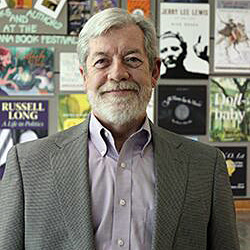

Jim Davis
State Library of Louisiana/Louisiana Center for the Book
Tell us a bit about yourself, the organization you represent, and the work you do.
I’m the director of the Louisiana Center for the Book in the State Library of Louisiana. A native of Columbia, Tennessee, and graduate of Middle Tennessee State University in Murfreesboro with an MA in English, I’ve lived in the New Orleans area since 1977. I’ve been here as center director since May 2008, so over 10 and a half years. As Louisiana’s affiliate with the Center for the Book in the Library of Congress and under the leadership, guidance, and support of State Librarian Rebecca Hamilton, we promote reading and literacy on the state level through various programs, particularly the annual Louisiana Book Festival, for which I serve as director, focusing on Louisiana authors, books from Louisiana independent and university presses, and books about or set in our state. Realizing that attendees don’t just read about Louisiana or just Louisiana authors, we also feature authors and books of national and international note.
Tell us about your community/the communities you serve, and your part of the country.
Physically we are located in Baton Rouge, the capital of Louisiana, but we serve the entire state from the Gulf Coast and bayous of southern Louisiana to the hills of northern Louisiana. We stress that ours is the state’s book festival, free and open to all. As state coordinator of the Library of Congress’s Letters About Literature competition, for example, we reach into all 64 parishes of the state. I think most people know, but we don’t have counties in Louisiana; we have parishes.
What did it mean to you and your community to host the U.S. Poet Laureate?
We were of course honored that Louisiana was selected as the final destination on the final leg of her 2018 tour, with her mid-December visit an early Christmas present for us. Likewise, the folks at Lafourche Parish Public Library were delighted to learn that Tracy asked to go down on the bayou and that they would be able to welcome her to their venues chosen for Tracy’s public appearances. Likewise, the chief and members of the United Houma Nation were gratified that Tracy would devote some of her limited time to meeting with and learning about them and the issues they face, including displacement due to the erosion of their wetlands. We so appreciate LPPL’s Director Laura Sanders and her staff, and the folks at the Jean Lafitte Wetlands Acadian Cultural Center, for welcoming us to their sites for Tracy’s programs.
Can you share any feedback you received from event attendees/participants?
Even before Tracy’s visit, people were so impressed and proud that she was touring the country and going into states’ rural areas to meet with them, bypassing the urban areas where authors more typically go, and that she was coming not to just make an appearance before them, but to have “American conversations” with them.
They weren’t disappointed. So many expressed to me how down to earth Tracy is, how accessible she is, and that her approach to talking back and forth about poems made poetry likewise more accessible, less alien to them, less intimidating because Tracy verbalized and demonstrated an approach that can be internalized when reading and hearing poetry in the future. Tracy made us all proud that she is our national Poet Laureate, and that we actually have a national Poet Laureate. Interviews as part of our video of the event show you some of the positive reactions and the appreciation felt.
At the Friday night event, one dad shared with us that his six-year-old daughter saw announcement of the program in the newspaper and insisted that he bring her to see the national Poet Laureate. Fortunately, more than just seeing Tracy, she got to meet and talk with her at the reception held before the program. In contrast, poet Darrell Bourque, twice the Louisiana Poet Laureate, traveled 246 miles round-trip from Church Point to Thibodaux to attend.
What, if any, type of literary programming do you present in your community? How did this program fit in?
The Louisiana Center for the Book presents literary programming annually to celebrate Black History Month in February at the State Library. For several years now, we’ve celebrated National Poetry Month with “Just Listen to Yourself: Louisiana’s Poet Laureate Presents Louisiana Poets” with our state’s poet laureate hosting poets from across the state for a reading. The premiere event is our late fall one-day Louisiana Book Festival which draws 25-30K attendees to more than 100 programs and events featuring 150+ authors and panelists in more than 15 locations in the State Capitol, State Library, Capital Park Museum, Welcome Center, and surrounding Capitol Park area. See www.LouisianaBookFestival.org.
